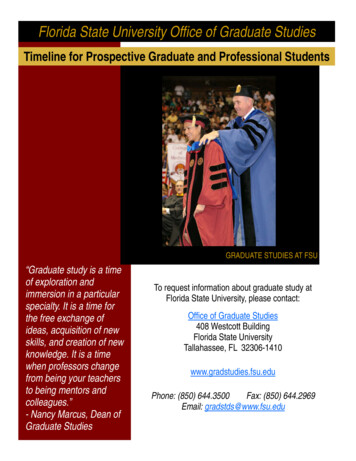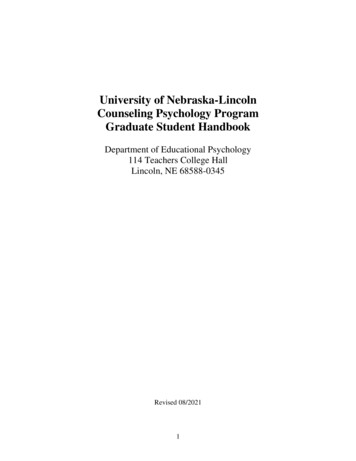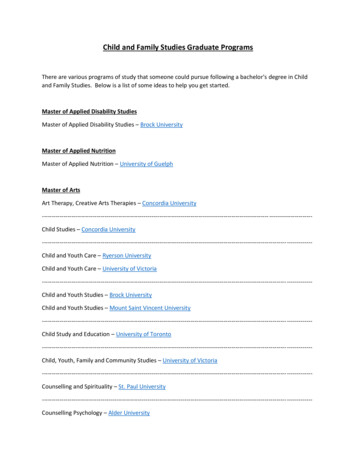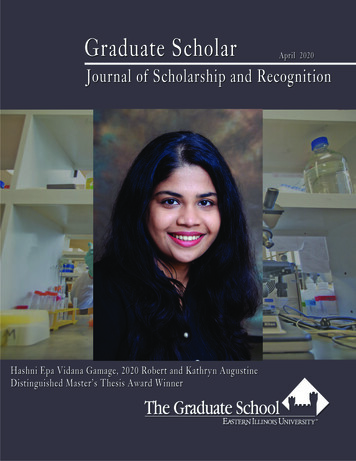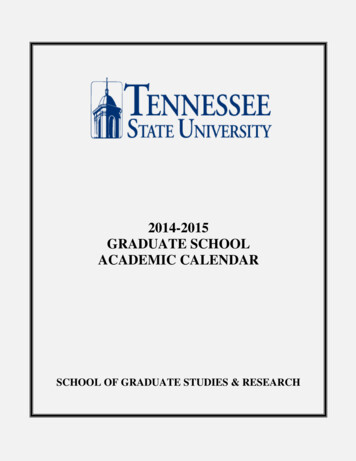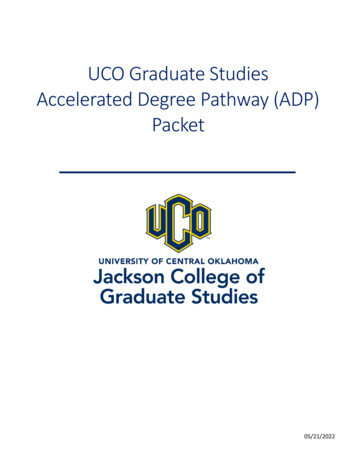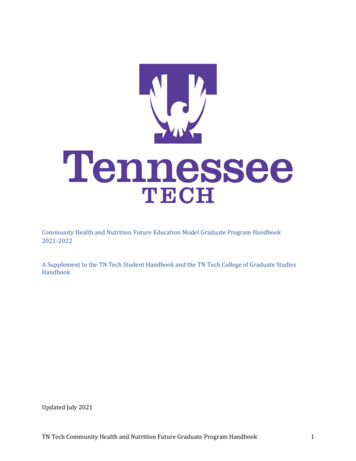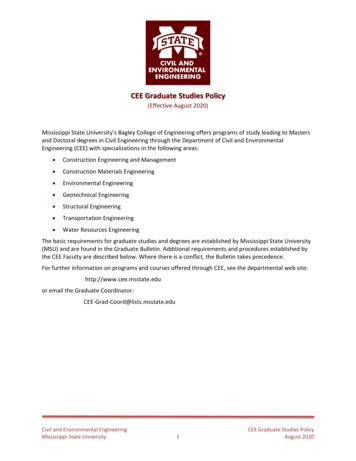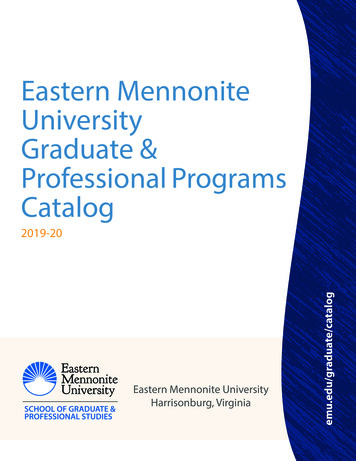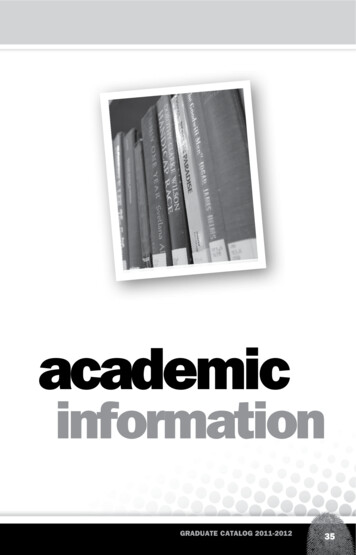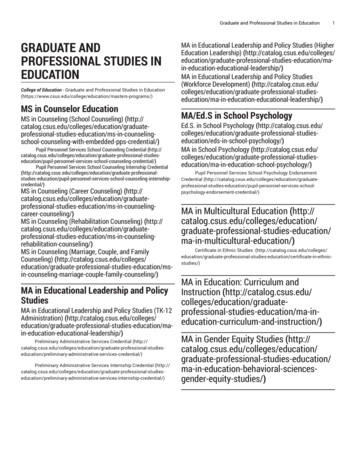
Transcription
Graduate and Professional Studies in EducationGRADUATE ANDPROFESSIONAL STUDIES INEDUCATIONCollege of Education - Graduate and Professional Studies in asters-programs/)MS in Counselor EducationMS in Counseling (School Counseling) il Personnel Services School Counseling Credential ervices-school-counseling-credential/)Pupil Personnel Services School Counseling Internship ential/)MS in Counseling (Career Counseling) areer-counseling/)MS in Counseling (Rehabilitation Counseling) ehabilitation-counseling/)MS in Counseling (Marriage, Couple, and FamilyCounseling) marriage-couple-family-counseling/)MA in Educational Leadership and PolicyStudiesMA in Educational Leadership and Policy Studies (TK-12Administration) ducational-leadership/)Preliminary Administrative Services Credential istrative-services-credential/)Preliminary Administrative Services Internship Credential istrative-services-internship-credential/)1MA in Educational Leadership and Policy Studies (HigherEducation Leadership) ducational-leadership/)MA in Educational Leadership and Policy Studies(Workforce Development) ducational-leadership/)MA/Ed.S in School PsychologyEd.S. in School Psychology chology/)MA in School Psychology chool-psychology/)Pupil Personnel Services School Psychology EndorsementCredential A in Multicultural Education ral-education/)Certificate in Ethnic Studies ethnicstudies/)MA in Education: Curriculum andInstruction rriculum-and-instruction/)MA in Gender Equity Studies behavioral-sciencesgender-equity-studies/)
2Graduate and Professional Studies in EducationMA in Language and Literacy language-and-literacy/)Reading and Literacy Added Authorization (forthcoming)Reading and Literacy Leadership Specialist Credential(forthcoming)Certificate of Competency - Teaching Reading to Adults ompetency-in-teaching-reading-to-adults/)Dr. (edd@csus.edu)Vajra Watson, Program Director, Ed.D.Eureka Hall 318(916) 278-2282Doctorate Program Website educational-leadership/)FacultyADAMSON, FRANKBOOSALIS, CHRISBROCK, STEPHENCHAVEZ, JOSECOWAN, GENIDoctorate in Education (Ed.D.) cation/)Preliminary Administrative Services CredentialCertificate in Maker Education maker-education/)MA in Universal Design for eLearning(forthcoming)Notice to Students RE: Professional Licensure and CertificationFLORES, ARACELIHOLLAND, MELISSAJOO, HYUNGYUNGJOUGANATOS, SARAHLILES-LOURICK, ELISABETHLILLY, FRANKLOZANO, ALBERT S.MARSHALL, RACHAELMERRILL, MARCYMORENO, JESSICAMORGAN, ELIZABETHNEVAREZ, CARLOSCalifornia State University programs for professions that require licensureor certification are intended to prepare the student for California licensureand certification requirements. Admission into programs for professionsthat require licensure and certification does not guarantee thatstudents will obtain a license or certificate. Licensure and certificationrequirements are set by agencies that are not controlled by or affiliatedwith the California State University and licensure and certificationrequirements can change at any time.O'MALLEY, MEAGANThe California State University has not determined whether its programsmeet other states’ educational or professional requirements for licensureand certification. Students planning to pursue licensure or certificationin other states are responsible for determining whether, if they completea California State University program, they will meet their state’srequirements for licensure or certification. This disclosure is madepursuant to 34 CFR §668.43(a)(5)(v)(C).SABATI, SHEEVAContact InformationDr. Sarah Jouganatos, Interim Chair, Graduate and Professional Studies inEducationEureka Hall 401(916) 278-5557Graduate and Professional Studies in Education Website ograms/)PARK, SANGMINRIVAS, BITARIVAS, ANTHONYROMERO, LISASCARTON, CARLYSIDORKIN, ALEXANDERWATSON, VAJRAWILLIAM, LISAWILLIAMS, EBONYWYCOFF, SUSAN E.XIONG, MAIKO
Graduate and Professional Studies in EducationEDC 205. Advanced Counseling Theory and Multicultural SystemsAbroad.3 UnitsPrerequisite(s): EDC 216, EDC 280, EDC 210, EDUC 155, and EDUC 156Term Typically Offered: Summer onlyThis course is designed to provide students with a foundation in thephilosophy and practice of contemporary theories of counseling andpsychotherapy. Course material is aimed at helping students developbasic skills necessary for effective counseling and communicatingwith clients. Students will engage in: (1) personal growth in counseloridentity development, (2) counseling skills development utilizing multipleapproaches, and (3) theory integration and multicultural systems.Students will be actively involved in their learning and invited to shareknowledge.Note: This course is a study abroad experience.EDC 210. Social Justice and Culturally Competent Counseling. 3 UnitsPrerequisite(s): Classified and/or admitted student in MS CounselingprogramTerm Typically Offered: Fall onlyExploration of ethnic and cultural differences to develop or expandawareness, techniques, skills, theories, concepts, and to acquireinformation necessary to counsel effectively with clients of variouscultural groups. Students examine their own attitudes, behaviors,perceptions, and biases, and are encouraged to develop their ownmulticultural approach to counseling.EDC 212. Couple Counseling: Gender, Power, & Sexuality.Term Typically Offered: Fall, Spring3 UnitsThis course covers the foundations of couples therapy, includingidentification of assessments, theories, and intervention skills to treatcouples. Topics include human sexuality; physiological, psychological,and social cultural variables associated with sexuality and genderidentity; the assessment and treatment of psychosexual dysfunction; andIntimate Partner Violence/Domestic Violence. This course will seek toincrease awareness, personal perceptions, affect, and attitudes related togender, gender identity, and sexuality. Meets Board of Behavioral Sciencerequirements in human sexuality and domestic violence.EDC 214. Dynamics of Human Development.3 UnitsPrerequisite(s): Classified or Admitted Student in MS Counseling programTerm Typically Offered: Spring onlyOverview of theories and research pertaining to the dynamics of humandevelopment, including cultural, biological, social, and psychologicalfactors. Particular emphasis will be placed on the relationship ofthese factors to the field of counseling. Lifespan coverage includesconception, pregnancy, birth, infancy-toddlerhood, early/middle childhood,adolescence, early/middle/late adulthood, as well as dying, death, andbereavement.3EDC 216.Counseling Theory.3 UnitsPrerequisite(s): Classified, or Admitted Student, in MS CounselingprogramCorequisite(s): EDC 280. Please sign up for the same section of 216 and280 as they are paired by section.Term Typically Offered: Fall onlyExamination of ten counseling philosophies, with emphasis onknowledge and practice. Requires the refinement of one's own counselingorientation. Designed to provide students with a foundation in thebasic philosophy and practice of contemporary theories of counseling/psychotherapy. The requirements support three components of multiplemeasures of learning and outcomes: 1) personal growth, 2) counselingskills building utilizing multiple approaches, 3) professional development.EDC 218. Assessment In Counseling.3 UnitsPrerequisite(s): Classified, or Admitted, Student in MS CounselingprogramTerm Typically Offered: Fall, SpringIntended to acquaint the prospective counselor with an array ofassessment instruments and appraisal techniques. Includes practicalexperience with tests as well as foundations of test development. Lecturethree hours.EDC 219. Group Processes in Counseling.3 UnitsPrerequisite(s): EDC 216 and EDC 280, classified student in the CounselorEducation Program.Term Typically Offered: Fall, SpringGroup process theory and procedures, including group counselingand guidance. Participation in a group experience is required. Lecture,discussion, three hours.EDC 220.The Spiritual Dimension in Counseling and Psychotherapy.3 UnitsPrerequisite(s): EDUC 155, EDUC 156, EDC 216, EDC 280; or instructorpermission.Term Typically Offered: Fall, SpringInvestigation into concerns and issues, modes, and methodologiessurrounding exploration of the spiritual dimension in the counseling/therapy relationship. Experiential activities are included.EDC 222. Clinical Stress Reduction.Term Typically Offered: Fall, Spring3 UnitsMajor concepts, theories, and approaches to effective stress reduction.Includes stress level assessment, planning and implementation ofa stress reduction program. Practice of beneficial stress reductiontechniques and application in clinical practice.Note: Open to unclassified students with instructor permission.EDC 230.Law and Ethics for Marriage, Family, and Child Counseling.3 UnitsPrerequisite(s): EDUC 155, EDUC 156, EDC 216, EDC 280 or instructorpermission.Term Typically Offered: Fall, SpringLegal and ethical considerations in the practice of marriage, family,and child counseling. Current laws, responsibilities, restrictions,rights and privileges, licensing regulations, and ethical standards ofmajor professional groups. Child abuse assessment and reportingrequirements. Organization, administration, and management ofindependent practice. Lecture three hours.
4Graduate and Professional Studies in EducationEDC 231. Diagnosis and Treatment Planning.3 UnitsPrerequisite(s): EDC 216, EDC 218, EDC 280; classified student in theCounselor Education Program.Term Typically Offered: Fall, SpringThis graduate level course provides students with an overview ofadult and child psychopathology presented as a manifestation ofmultiple biological, psychological, sociocultural and other factors. Itoffers an advanced discussion of psychopathology with an emphasison biopsychosocial assessment, differential diagnosis, use of theDiagnostic and Statistical Manual of Mental Disorders, and developmentof treatment plans. Lecture three hours.EDC 232.Family Violence.3 UnitsPrerequisite(s): EDC 212, EDC 230, EDC 234; or instructor permission.Term Typically Offered: Fall, SpringViolence in the family includes spouse abuse, child abuse, incest, andsexual abuse. Myths about these areas will be replaced by empiricallybased facts. There will be an emphasis on effective treatment methods;research findings on family violence, including etiology and familypatterns; overlap with alcohol and other drugs, and maintenance factors.Students will gain techniques and skills in interviewing, assessment, andcounseling when violence is a presenting issue.EDC 233. Substance Use and Addiction Counseling.3 UnitsPrerequisite(s): EDC 231, classified student in the Counselor EducationProgram.Term Typically Offered: Fall, SpringProvides an overview of substance use disorders, addiction, andco-occurring disorders. Students will develop an understanding ofSubstance Use Disorders (SUD's); the physiological, psychological,behavioral, and social consequences on the user and family members;to facilitate the development of addiction counseling competenciesthat are associated with positive treatment outcomes, and to increasethe student¿s level of confidence relative to providing substance useevaluation, education, and treatment services. Emphasis will be placed ondeveloping and practicing substance use counseling skills.EDC 234. Seminar: Marriage and Family Counseling.3 UnitsPrerequisite(s): EDC 216, EDC 280; classified student in the CounselorEducation Program.Term Typically Offered: Fall, SpringEDC 239. Foundations in Rehabilitation Counseling.3 UnitsPrerequisite(s): Classified student in the MS Counseling programTerm Typically Offered: Spring onlyThis foundation course is designed to introduce and orient studentsto the profession of rehabilitation counseling, the various setting inwhich services are performed, and federal laws that dictate deliveryof rehabilitation services. Students will learn about the history anddevelopment of rehabilitation counseling and the current issues relevantto this specialization including historical and contemporary perspectiveson disability, societal attitudes towards disability and its influence onindividuals with disabilities.EDC 240A. Medical Aspects of Disability.3 UnitsPrerequisite(s): Classified or Admitted Student in the MS CounselingprogramTerm Typically Offered: Fall, SpringThis course focuses on the medical aspects of various congenital,hereditary, and trauma-induced disabilities. The etiology, pathology,treatment, symptoms, prognosis, and limitations caused by variousdisabling medical conditions are covered. Implications of medicaldisabilities are explored inclusive of its relationship to vocationaladjustment. Areas of exploration include motivation, self-concept, andpersonal and societal attitudes toward disability. This course will includea survey of psychosocial aspects of disability as it pertains to medicalaspects of disability.EDC 240B. Psychosocial Aspects of Disability.3 UnitsPrerequisite(s): Classified or Admitted Student in MS Counseling programTerm Typically Offered: Fall, SpringThe primary focus of this course will be on the psychosocial aspects ofdisability including the psychological genesis of and social implicationsaffecting individuals with disabilities. Various psychological disabilitieswill be explored in concert with treatment considerations. This coursebuilds on knowledge gained in the EDC 240A: Medical Aspects ofDisability. The course will explore rehabilitation philosophy and processesfrom a holistic standpoint to enhance coping and skill development to aidin vocational adjustment.EDC 241. Developmental Stages and Art Therapy Techniques.Prerequisite(s): EDUC 155 and EDUC 156.Term Typically Offered: Fall, Spring3 UnitsIntroduction to the basic concepts and principles of family therapy.Provides and lays the foundation on which all theories/schools of familytherapy are based and covers the basic theories of family therapy.Issues include evaluation of families, diagnosis in a family context,interviewing strategies, redefining problems in a family systems context,and treatment principles. Lecture three hours.In-depth study of normal stages of development in art with specialemphasis on the developmental stages as both diagnostic indicators andaids in devising art therapy treatment. Includes hands-on experience witha variety of art therapy techniques and discussion of their applicabilityto different client populations. Purchase of some basic art supplies isrequired. Lecture, discussion, three hours.EDC 238. Professional Issues in Marriage Couple and FamilyCounseling.Term Typically Offered: Fall, SpringEDC 242. Play and Art in Therapy with Children.3 UnitsPrerequisite(s): EDC 216, EDC 280, classified student in the SchoolCounseling Specialization. Other Counselor Education students may bepermitted to enroll when space is available.Term Typically Offered: Fall, Spring2 UnitsThis course will provide MCFC students an advanced overview of currentevidence-based practices, intervention techniques, and treatmentstrategies for diverse populations. This class will challenge studentsto conceptualize through a diverse therapeutic lens. Topics will includedomestic violence, death and dying, substance use disorder, patientswith HIV or AIDS, relational trauma, the foster care system, infidelity inmarriage and couples counseling, caring for caregivers, family law, andpractice/management considerations including HIPAA and third partyreimbursement.Explores the ways children use fantasy, play, and art as means forcommunication, growth and healing. Emphasis is placed on clinicalskills, therapeutic limit setting, counseling theory and developmentallyappropriate interventions. Purchase of some basic art supplies isrequired.
Graduate and Professional Studies in EducationEDC 244. Trauma and Crisis Counseling.Term Typically Offered: Fall, Spring3 UnitsThis course provides opportunities for both theory and skill developmentby examining crisis and trauma counseling, including crisis theory;multidisciplinary responses to crises, emergencies, or disasters;cognitive, affective, behavioral, and neurological effects associatedwith trauma; brief, intermediate and long-term approaches; assessmentstrategies for clients in crisis and principles of intervention for individualswith mental or emotional disorders during times of crisis, emergency, ordisaster.EDC 250. Education Research. Prerequisite(s): Graduate statusTerm Typically Offered: Fall, Spring3 UnitsEDC 250 will provide the study of qualitative and quantitative methodsused in the development of reliable knowledge in the field of education.It includes identification and formulation of research problems,research designs, and the presentation of reports representative ofdifferent research strategies. Scholars will be immersed in counselingdiscourse and a wide range of writing assignments in various genres.It is anticipated that this course will facilitate skills important to theevaluation of educational and psychological programs.EDC 252. Legal and Ethical Issues in Professional Counseling.Term Typically Offered: Fall, Spring3 UnitsEDC 261. Seminar in Counseling: Job Placement.Term Typically Offered: Fall, Spring53 UnitsAnalyzes and practice of job-seeking skills, employer information base,and job placement of the handicapped.EDC 262. Career Counseling Process.3 UnitsPrerequisite(s): EDC 260; classified student in the Counselor EducationProgram.Term Typically Offered: Fall, SpringOn-going learning of the processes needed to deliver career counselingservices to a variety of clientele. Students will extend their theoreticalknowledge base and will more clearly focus on the relationship betweena person's life and the process of career development. Elements to bestudied in more depth include career development theory, assessmenttechniques and strategies, goal setting, decision making, and integrationof multicultural aspects and strategies. A practical experience inadministering and interpreting selected test instruments extensivelyused in career counseling will be included. Lecture three hours; practicalexperience one hour.EDC 263.Advanced Case Conceptualization in Clinical Rehabilitation.3 UnitsPrerequisite(s): EDC 239 and Classified or Admitted Student in the MSCounseling programTerm Typically Offered: Fall, SpringDesigned to provide students with basic knowledge and skills necessaryto be legally and ethically competent in practice of counseling. Examinesethical and legal considerations pursuant to practice of counseling.Topics to be covered are ethics (CAMFT, AAMFT, ACA, ASCA, NCDA)related to counseling practice in private and public sectors, as wellas laws regarding mandatory child and elder abuse assessment andreporting, confidentiality, privilege, liability, marriage, family, childand school ethics and law. Required for graduation with a degree inCounseling.This course provides an in -depth review and study of the clinicalrehabilitation processes and continuum of care. This course will addresseffective clinical rehabilitation counseling assessments, interventions,and documentation. Students will apply principles, models, and usedocumentation formats of biopsychosocial case conceptualization andtreatment planning. This course will review strategies for interfacingwith medical and allied health professionals, including interdisciplinarytreatment teams culminating in a case management and clinical fileaddressing a holistic intervention for clients and consumers.EDC 254. Counseling and Psychotropic Medicine.3 UnitsPrerequisite(s): EDC 231 and Classified or Admitted Student in the MSCounseling programTerm Typically Offered: Fall, SpringEDC 264. Seminar in Counseling: Career Systems Development. 3 UnitsPrerequisite(s): EDC 260; classified student in the Counselor EducationProgram.Term Typically Offered: Fall, SpringProvides an introduction to psychopharmacology; the biological basesof behavior; basic classifications, indications, and contraindicationsof commonly prescribed psychopharmacological medications; andeffective approaches to collaborating with clients, their families and otherprofessionals so that appropriate referrals can be made for medicationevaluations and so that the side effects of those medications can beidentified. Meets the BBS licensure requirements for Professional ClinicalCounselors and Marriage and Family Therapists.Specific emphasis is at the implementation level, with students learningthe necessary skills for implementing, maintaining, and stimulatingcareer development in schools, community agencies or private industry.Lecture three hours.EDC 260.Career Development.3 UnitsPrerequisite(s): Classified or Admitted Student in MS Counseling programTerm Typically Offered: Fall, SpringProvides a basic introduction to career development and careercounseling. Identification and assessment of issues common in careercounseling settings are examined. Group and individual models of careerdevelopment and counseling in schools, community agencies or privateindustry are also investigated and discussed. Lecture three hours.EDC 266. Seminar in Counseling: Career Program Development. 3 UnitsPrerequisite(s): EDC 260; classified student in the Counselor EducationProgram.Term Typically Offered: Fall, SpringSpecific emphasis is at the program development level, with studentslearning the necessary components for developing a career counselingprogram in schools, community agencies, or private industry. Lecturethree hours.
6Graduate and Professional Studies in EducationEDC 268. Career and Job Search.Prerequisite(s): EDC 260 or instructor permission.Term Typically Offered: Fall, Spring3 UnitsWork is undergoing change with the advent of new technologies, anincreasingly diverse workforce, and corporate restructuring. Theseconditions have led to more frequent occupational shifts and the lossof previously secure jobs, self-reliance replacing loyalty in relationsbetween employers and employees, and fragmented careers becomingmore common as family responsibilities and work opportunities becameincreasingly interwoven. Examines traditional and emerging approachesfor assisting clients in a changing and evolving job market.EDC 270. Organization and Administration of School CounselingPrograms.3 UnitsTerm Typically Offered: Fall, SpringPrinciples and practices necessary to plan, initiate, administer, andevaluate school counseling programs, including related laws. Lecture,discussion three hours.EDC 272. Counseling Children and Youth.3 UnitsPrerequisite(s): EDC 216, EDC 280, classified student in CounselorEducation Program. School specialization: EDC 242.Corequisite(s): School Counseling Specialization: EDC 475.Term Typically Offered: Fall, SpringProvides students with a theoretical foundation and working knowledgeof contemporary issues and interventions for children and youth. Avariety of presenting problems and treatment strategies are explored.EDC 274.Advocacy and Systemic Change in School Counseling.3 UnitsPrerequisite(s): EDC 216, EDC 280, EDC 270; classified student in theCounselor Education Program.Term Typically Offered: Fall, SpringThis course provides an overview of consultation, leadership, andadvocacy models with emphasis on their use and application in schoolsettings. The effective counselor must be able to employ consultation,advocacy, and leadership skills in order to meet the needs of students.Methods for analyzing data to design intentional and developmentalschool counseling interventions will be explored.EDC 280. Counseling Skills Lab.2 UnitsPrerequisite(s): Classified Student in MS Counseling programCorequisite(s): EDC 216. Please sign up for the same section of EDC 216and 280, they are paired by section.Term Typically Offered: Fall onlySupervised practice in the basic styles of communication, verbal andnonverbal, with additional focus on the particular skills of selectedtheories. In conjunction with EDC 216, the material in this course isaimed at helping students develop basic skills necessary for effectivelycounseling and communicating with clients. The course requirementssupport three components: (1) personal growth, (2) counseling skillsdevelopment utilizing multiple approaches, and (3) professionaldevelopment. Students are expected to be actively involved in theirlearning.Note: Recommended to be taken within the first 6 units of study in theCounselor Education ProgramCredit/No CreditEDC 282. Practicum in Group Counseling.2 UnitsPrerequisite(s): EDC 219; classified student in the Counselor EducationProgram.Term Typically Offered: Fall, SpringSupervised practice in leadership of group counseling. Lecture one hour;laboratory three hours.Credit/No CreditEDC 294. Cooperative Education Experience.3 UnitsPrerequisite(s): Open only to upper division and graduate students;consent of Department Chair.Term Typically Offered: Fall, SpringCooperative Education (Co-op) relates academic theory to professionalpractice by providing paid work experience in the student's major fieldof study and academic credit. Students receive supervised employmentin school districts, state and community agencies, companies, andother appropriate settings. Requires attendance at weekly meetings,preparation of application packet, completion of field study assignment,and a written final report.Note: Units may not be used to meet course work requirements. May berepeated once for credit.Credit/No CreditEDC 296P. Current Issues in Counseling: Meditation.Term Typically Offered: Fall, Spring1 UnitAn introductory experimental class in meditation which provides a basicfoundation of basic meditative theories, the experience of meditativepractices, and a basic knowledge of meditative techniques of benefit bothpersonally and with clients. Research has demonstrated that meditationis helpful in a number of stress-related conditions and recent researchindicates it is often more effective than psychotherapy in treatment ofsome problems.Note: Instructor approval required. May be taken twice for credit.Credit/No CreditEDC 299. Special Problems.Term Typically Offered: Fall, Spring1 - 3 UnitsIndividual projects at graduate level designed especially for studentscapable of independent study.Note: Admission by approval of the instructor with whom the student willbe working directly and the Department Chair.Credit/No Credit
Graduate and Professional Studies in EducationEDC 475. Practicum In Counseling.3 UnitsPrerequisite(s): Prerequisites for all specializations: EDC 210, EDC 214,EDC 216, EDC 280. Additional prerequisites by specialization: Career EDC 212 , EDC 218, EDC 219 , EDC 260, EDC 262 ; Community - EDC201, EDC 212 , EDC 218, EDC 219; MFCC - EDC 212, EDC 218 , EDC 219,EDC 234, EDC 252 , EDC 476; School - EDC 252 , EDC 270.Corequisite(s): By specialization: School - EDC 272.Term Typically Offered: Fall, SpringSupervised counseling practice in agency and/or school settings.Emphasis on application of counseling theories and the integrationof one's own counseling philosophy into practical applications. Basicrequirements: 100 clock hours with at least 40 client contact hours, 1hour per week of individual/triadic supervision, and one and half hoursper week of group supervision.Note: Department petition is required the semester prior to enrollment.Credit/No CreditEDC 476. Advanced Skills in Marriage and Family Counseling.1 UnitPrerequisite(s): Classified student in the MS Counseling program andmarriage, couple, family counseling concentrationTerm Typically Offered: Fall, SpringStructured observation and supervised pract
Graduate and Professional Studies in Education 3 EDC 205. Advanced Counseling Theory and Multicultural Systems Abroad. 3 Units Prerequisite(s): EDC 216, EDC 280, EDC 210, EDUC 155, and EDUC 156

